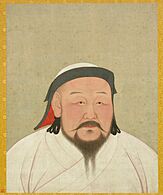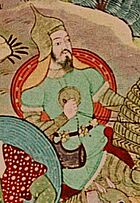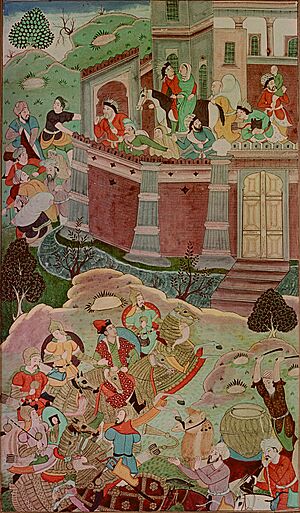Toluid Civil War facts for kids
Quick facts for kids Toluid Civil War |
|||||||
|---|---|---|---|---|---|---|---|
| Part of the division of the Mongol Empire | |||||||
|
|||||||
| Belligerents | |||||||
| Kublai Khan and his allies | Ariq Böke and his allies | ||||||
| Commanders and leaders | |||||||
|
|
||||||
The Toluid Civil War was a big fight between two brothers, Kublai Khan and Ariq Böke. It happened from 1260 to 1264. They were fighting to see who would become the next leader of the huge Mongol Empire.
Their older brother, Möngke Khan, died in 1259. He didn't say who should take his place. This caused a big argument among the Tolui family. This argument quickly turned into a civil war. This war, and others that followed, made the Mongol Empire weaker. It also split the empire into several smaller, independent parts.
Contents
Why the War Started
The Tolui family had successfully made Möngke the Great Khan in 1250 and 1251. Other families, like the Ögedei and Chagatai, were not happy. They even tried to kill Möngke, but they failed. Möngke then punished many of his opponents from these families.
In 1252, Möngke gave control of the Caucasus region to the Golden Horde. Later, Berke became the leader of the Golden Horde in Russia. Meanwhile, Hulagu, another Mongol leader, took control of the Caucasus from the Golden Horde. Hulagu also attacked and destroyed Baghdad in 1258. This made Berke, who was a Muslim, very angry.
When Möngke Khan died in 1259, he hadn't clearly chosen his successor. He probably liked Ariq Böke more. Möngke had made Ariq Böke the commander of Karakorum, the Mongol capital. But Möngke didn't do enough to make sure Ariq Böke would become the next Great Khan.
The Civil War Begins
In 1260, Kublai Khan was fighting in southern China. He then heard that his brother, Ariq Böke, wanted to be the next Great Khan. Ariq Böke had made friends with many powerful Mongol nobles. They supported him for the throne. Most of Möngke's close family also supported Ariq Böke.
Kublai stopped his fight in China and gathered his army to fight Ariq Böke. In China, Kublai held a meeting called a kurultai in Kaiping. There, he was chosen as the Great Khan. This was the first time a Great Khan was chosen outside of Mongolia. A month later, Ariq Böke held his own kurultai in Karakorum. He was also named Great Khan there. So, now there were two leaders claiming the same title!
Hulagu, another powerful Mongol leader, was supposed to go to the kurultai. But his army was defeated by the Mamluks at the Battle of Ain Jalut. So he had to go back to the Middle East. Berke used this chance to attack Hulagu's lands. This started the Berke–Hulagu war.
Ariq Böke teamed up with Berke Khan and Alghu of the Chagatai Khanate. Hulagu was the only ally of Kublai Khan. Berke supported Ariq Böke because he didn't like Hulagu. But Hulagu and Berke were busy fighting each other. So, they couldn't help much in the Toluid Civil War.
Kublai's Smart Moves
Kublai Khan had a big advantage. He could get supplies from the rich lands of China. Ariq Böke, however, had to bring supplies to Karakorum, which was in a dry, grassy area. Kublai needed the Chinese people to support him to win the war.
Kublai made himself popular with the Chinese people. He listened to his Chinese advisors. He acted like a wise emperor who could unite the Chinese, Koreans, and Mongols. He said Ariq Böke was a destructive leader. Kublai promised to lower taxes. He also made his government similar to Chinese dynasties. He even took a Chinese-style name for his rule, Zhongtong, meaning "moderate rule."
These ideas were popular in northern China. But they didn't help with the Southern Song dynasty. The Song attacked while Kublai was busy with the civil war. They took back land they had lost to the Mongols. Kublai sent a diplomat to talk about peace with the Southern Song. But the Song refused and kept Kublai's diplomat in prison for ten years.
The Fight for Supplies
Kublai now controlled three of the four ways to get supplies to Karakorum. Kadan, Kublai's ally, protected lands in western China. He also commanded troops there. Kublai's own soldiers guarded the area around Beijing. The only supply route left for Ariq Böke was through the Yenisei River valley in the northwest.
When Kublai's army moved towards Karakorum in late 1260, Ariq Böke left the city. He went to a river near the Yenisei. Winter was coming, so both armies had to stop and wait for spring.
During the winter, Kublai got more supplies and soldiers. He made his defenses stronger in northern China. Kadan, Kublai's ally, defeated and killed Alandar. Alandar was a general sent by Ariq Böke to get control of important trade routes.
Lian Xixian, one of Kublai's advisors, led soldiers in western China. He won a battle against Ariq Böke's ally, Liu Taiping. He took food supplies meant for Ariq Böke's army. Lian also forced Ariq Böke's supporters out of two towns. In southwestern China, his forces protected a region from Ariq Böke's troops. Kublai rewarded Kadan and Lian Xixian greatly for their help.
Kublai's victories meant that Alghu was Ariq Böke's only strong ally left. Ariq Böke convinced Alghu to take control of the Chagatai Khanate. The previous leader of Chagatai had recently died. Alghu fought and killed a rival who Kublai supported. Alghu became the leader of Chagatai. This area became a key source of supplies for Ariq Böke. Ariq Böke gave Alghu full control over taxes there.
In 1261, Kublai and Ariq Böke fought a battle at Shimultai. Ariq Böke lost and had to retreat. Ten days later, he attacked a small part of Kublai's army. The battle ended in a tie. By this time, Kublai controlled most of Mongolia. This threatened Ariq Böke's supply line. Ariq Böke asked Alghu for help. But Alghu refused and even killed Ariq Böke's messengers.
A rebellion in China then made Kublai leave the civil war for a while. Ariq Böke then went to war with Alghu. Alghu defeated Ariq Böke's commander, Khara Bukha, near the Ili River. But Ariq Böke took Alghu's main base. Alghu then moved to cities in the Tarim Basin.
Ariq Böke now had very few friends left. Many of his supporters left him after he attacked the Chagatai Khanate. Ürüng Tash, Möngke's son, switched sides. He gave Kublai his father's special seal, showing his loyalty. Alghu then returned to the Ili River to push Ariq Böke out of the region. Ariq Böke had no supplies or allies left to fight. He traveled alone to Shangdu and gave up to Kublai in 1264. This ended the civil war.
What Happened Next
Kublai put Ariq Böke in prison. He didn't punish him right away. Kublai's supporters wanted revenge. So, Kublai ignored Ariq Böke for a year as a punishment. Kublai also removed officials who had supported Ariq Böke. He accused Bolghai, an important official, of working against him. Kublai ordered Bolghai and other supporters of Ariq Böke to be killed.
Kublai called a kurultai to decide Ariq Böke's punishment. He also wanted to make sure everyone accepted him as Great Khan. Kublai didn't want to punish his brother without the support of the Mongol nobles. Ariq Böke died mysteriously in prison in 1266. Some people thought Kublai might have secretly poisoned him.
Even though Kublai won, his victory couldn't stop the Mongol Empire from breaking apart. When Kublai held his kurultai to confirm his leadership, none of the other three main Mongol leaders came. Berke and Hulagu kept fighting until Hulagu died in 1265.
The Ögedei family wanted to use this chance to gain power. They were still angry about what happened in 1251. Kaidu, from the Ögedei family, believed that someone from his family should be Great Khan. He started a rebellion against Kublai in 1269 that lasted for many years.
Most of the Mongol leaders in the west did not see Kublai as their Great Khan. Even though some still asked Kublai to approve their new leaders, the four main Mongol groups became independent countries. The Ilkhanate in Persia and Kublai's Yuan dynasty in China had good relations. They shared science and culture. But the four Mongol groups never worked together militarily again. The united Mongol Empire had truly broken apart.
See also
- Berke–Hulagu war
- Kaidu–Kublai war
- Division of the Mongol Empire
 | Dorothy Vaughan |
 | Charles Henry Turner |
 | Hildrus Poindexter |
 | Henry Cecil McBay |




